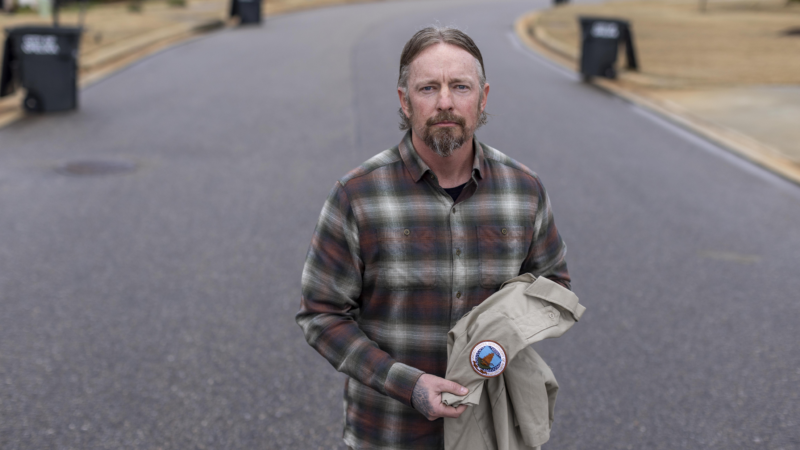A military vet and a scientist were securing America’s food system. Trump fired them
Derek Copeland was 11 days away from hitting his one-year mark with the U.S. Department of Agriculture when he received his termination letter on Feb. 14.
“You have not demonstrated that your further employment at the Agency would be in the public interest,” the notice said.
Copeland was shocked. His performance appraisal stated that he was “fully successful” in performing the critical functions of his job as a training specialist at the National Detector Dog Training Center in Newnan, Ga.
Moreover, while he’d been at the USDA less than a year, he’d spent his career working with dogs. Copeland had recently retired from two decades of service in the Air Force, most of that time in canine units, running kennels and training dogs to sniff out narcotics and explosives, among other tasks.

In Georgia, his job was to train dogs and their handlers to find agricultural products that aren’t supposed to come into the U.S., a critical layer of protection for the U.S. food system.
“I gave blood, sweat and tears to this country for 20 years to continue service to the federal government, doing what I was trained to do by them,” he says. “I kind of feel like I was just thrown out like a piece of trash.”
Copeland is part of a slew of federal employees who’ve been fired in recent days. Now, many are vowing to fight back, and attorneys exploring legal action say they may have a case.
A mass firing of probationary employees
Since last week, the Trump administration has fired more than 10,000 federal employees, including at the National Institutes of Health, the Small Business Administration, the Department of Energy and elsewhere. Still more are getting termination letters this week.
It’s part of President Trump’s broader plan, executed in large part by his billionaire adviser, Elon Musk, to dramatically downsize the federal workforce from its current 2.3 million employees, eliminate waste and save American taxpayers money.
A majority of those fired were still considered probationary, a status that lasts one to three years, depending on the position. Federal employees gain civil service job protections only once their probationary period is up.
Already, the Alden Law Group and Democracy Forward, a nonprofit organization that’s a frequent foil of the Trump administration, have filed a classwide complaint with the Office of Special Counsel, asking it to intervene in the mass firings of probationary employees.
Attorneys elsewhere say the workers may have other pathways to contest their dismissals, based on the language in the termination letters.
“The suggestion that somehow their skills or their abilities or knowledge is not a fit, that’s probably defamatory — and definitely if there’s a statement that their performance was inadequate,” says David Branch, an employment attorney in Washington, D.C., who has sued federal agencies on behalf of federal workers for years.
“If you can prove that this statement is false,” he says, “you probably have a claim for infringement upon your good name and reputation under the Fifth Amendment.”
Research to secure America’s food supply

In Logan, Utah, Michelle Kirchner’s work was also directly tied to American food security.
A postdoctoral researcher with the USDA’s Agricultural Research Service, Kirchner had been hired last spring to run a project helping alfalfa growers in Western states control pests while protecting pollinating bees. Alfalfa crops support the U.S. dairy industry.
Kirchner spent last summer in eastern Washington state, where temperatures at times topped 100 degrees.
“There’s no shade because it’s just alfalfa as far as the eye can see, and the sun just beats down on you all day, and they’re just bugs everywhere,” she says.
And she loved it.
Kirchner spent her days sampling fields for pests and pollinators and talking with growers about their operations and their priorities for research. Her work was recognized with a performance award.
Then in January, she and a colleague won a $25,000 grant through the Alfalfa Pollinator Research Initiative to further their study into protecting pollinators. Their proposal was chosen by the growers themselves.
“They were very excited about it. I had many of them tell me that personally,” she says.
Over 10 months, Kirchner has submitted three peer-reviewed manuscripts for publication. Now, she fears the research is “dead in the water.”
“My supervisor looked at me and said, ‘We won’t be able to continue this without you,'” she says.
The USDA’s Bee Biology and Systematics Laboratory was founded in the late 1940s. Now, key members of the lab’s research team are gone. Kirchner is struggling to make sense of the dismantling.
“The Agricultural Research Service part of the USDA is usually pretty buffered from a lot of the more partisan political actions, just because it’s people’s food,” she says. “You shouldn’t mess with people’s food.”
Not a “surgical approach”
Copeland is equally confounded by the termination of probationary employees at the dog training center in Georgia.
“It makes absolutely zero sense,” he says.
Copeland says the center had been looking to hire more training specialists to fulfill a growing demand from U.S. Customs and Border Protection for dogs and handlers.
The law enforcement agency uses dogs at airport terminals and other ports of entry, screening bags, passengers, vehicles and cargo warehouses for products that pose a danger to America’s crops.
“There’s so, so many crazy different diseases that can really mess up our food system,” Copeland says.

He’s incensed at talk he has heard on television that the Trump administration is taking a “surgical approach” to firings while also weeding out lazy federal employees who don’t want to return to the office.
“We were in an office actually doing the work that secures and protects this nation’s borders, which supposedly is a big priority,” says Copeland. “It’s all bull****.”
Probationary employees are often “the most industrious”
In his more than three decades practicing employment law, Branch has never seen a purge like what has unfolded over the past week. The mass firing of newer employees doesn’t make much sense to him.
“Probationary employees are usually … the most industrious employees there,” he says. “These folks know that they have a year to prove themselves, some folks two years, and if they don’t, they can be terminated for any reason.”
The challenge, he says, will be convincing a federal judge that the termination letters are in fact defamatory.
Branch is urging federal employees who believe they were illegally fired to collect any feedback or comments they received that refute the government’s claim that their performance was somehow poor or inadequate.
“They can’t tarnish your reputation. They can’t infringe upon your liberty interest. You have a liberty interest in your name, in your reputation,” he says. “No person shall be deprived of life, liberty and property without due process of law.”
Have information you want to share about ongoing changes across the federal government? NPR’s Andrea Hsu can be contacted through encrypted communications on Signal at andreahsu.08.
Transcript:
MARY LOUISE KELLY, HOST:
More than 10,000 federal employees have been fired since last week – mainly those who were in their first or second year on the job. Such probationary employees lack job protections. Now, attorneys are preparing to file class action lawsuits. NPR’s Andrea Hsu talked with two workers at the U.S. Department of Agriculture who are prepared to join the fight.
ANDREA HSU, BYLINE: Michelle Kirchner was a post-doc based out of the USDA’s bee lab in Logan, Utah.
MICHELLE KIRCHNER: I was working directly with farmers and growers of alfalfa.
HSU: Alfalfa – what dairy cows eat. She was helping the farmers figure out how to control pests while not harming the pollinators, the kind of research that’s not usually in the crosshairs of political fights.
KIRCHNER: Just because it’s people’s food and, like, you shouldn’t mess with people’s food.
HSU: And then there’s Derek Copeland, a retired Air Force veteran who spent much of his military career in a canine unit. Last year, he took those skills to the USDA’s National Detector Dog Training Center in Newnan, Georgia.
DEREK COPELAND: We train the dogs to find agricultural products that are not supposed to come in from other countries.
HSU: He also trains the handlers – the officers from Customs and Border Protection who patrol airports and ports of entry along the border.
COPELAND: They will screen bags, cars, passengers, cargo warehouses.
HSU: The dogs sniff out products that carry disease, things that could wreak havoc on…
COPELAND: Our whole food system.
HSU: Copeland and Kirchner were both in their first year at USDA. She had about two months left in her probationary period. He had 11 days. Last Friday, they got pretty much the same termination letter. It said…
KIRCHNER: Based on my performance, I had not demonstrated that my further employment would be in the public interest.
COPELAND: We don’t feel that it’s in the public interest to keep you on.
HSU: Both found the language shocking and offensive.
KIRCHNER: Like, it’s objectively not true.
HSU: In her 10 months on the job, Kirchner had received only positive performance reviews. She and her colleague even won a $25,000 grant to dig in more on protecting pollinators. Their proposal was chosen by the alfalfa growers themselves.
KIRCHNER: They were very excited about it. I had many of them tell me that personally.
HSU: Copeland had also received stellar performance reviews.
COPELAND: Everything was great and successfully meets, and there was no issues at all.
HSU: And this is why they and others plan to sue. David Branch thinks they’d have a case. He’s a longtime employment attorney in Washington, D.C. He says probationary employees, like all Americans, have due process rights under the Fifth Amendment. There are things the government can’t do.
DAVID BRANCH: They can’t tarnish your reputation. They can’t infringe upon your liberty interest. You have a liberty interest in your name, in your reputation.
HSU: The challenge, Branch says, will be convincing a judge that the termination letters citing inadequate performance are defamatory. He’s advising federal employees to gather any feedback or comments to prove their point. The Trump administration says these terminations are all about cutting waste and making the government more efficient. To Branch, that doesn’t make sense.
BRANCH: Probationary employees are usually the most industrious employees there. I mean, these folks know that they have a year to prove themselves – some folks two years – and if they don’t, they can be terminated for any reason.
HSU: Michelle Kirchner says her co-workers in the Logan bee lab are all deeply committed to improving U.S. agriculture. It’s why they’re out there in the alfalfa fields in the heat of the summer.
KIRCHNER: There’s no shade ’cause it’s just alfalfa as far as the eye can see. The sun just, like, beats down on you all day, and there are just bugs everywhere.
HSU: And Derek Copeland is equally committed to giving back to his country.
COPELAND: You know, I gave blood, sweat and tears to this country for 20 years, and to continue service to the federal government and doing what I was trained to do by them, which is train dogs – I kind of feel like I was just thrown out like a piece of trash.
HSU: Neither Copeland nor Kirchner is ready to leave their job behind.
Andrea Hsu, NPR News.
Climate change is boosting the risk of sleep apnea
Hotter temperatures make breathing problems during sleep more likely, even when it's not extremely hot
The David Lynch estate auction doubled as a caffeinated wake
Most of the bidding action was online. But at a ritzy Beverly Hills hotel, hopeful bidders united by genuine affection for Lynch admired the tools of the late artist's trade. It was a mirthful wake.
An AI video ad is making a splash. Is it the future of advertising?
The over-the-top ad combines the energy of Grand Theft Auto with the drama of the NBA Finals — all created by AI. Is it a sign of things to come?
‘It’s such a dream’: Top high school performers step out on Broadway
With a billboard in Times Square and a night on Broadway, the year's top high school performers are ready for their big moment at the Jimmy Awards.
4 takeaways on the U.S. airstrikes on Iran — and what might come next
The Trump administration said its strikes were intended to prevent Iran from developing a nuclear weapon. Now, Iran weighs a response against what it called an "outrageous" military operation.
Tick risks vary by region. Here’s where diseases have spread and how to stay safe
Tick bites are are on the rise this and they can carry some nasty illnesses. Which are most common depends where you live. Here's what to know to protect yourself.









